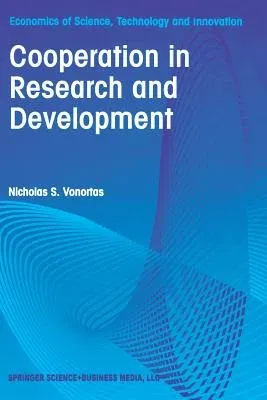Nicholas S Vonortas
(Author)Cooperation in Research and Development (1997)Paperback - 1997, 2 November 2012

Qty
1
Turbo
Ships in 2 - 3 days
In Stock
Free Delivery
Cash on Delivery
15 Days
Free Returns
Secure Checkout
Part of Series
Economics of Science, Technology and Innovation
Print Length
289 pages
Language
English
Publisher
Springer
Date Published
2 Nov 2012
ISBN-10
1461375185
ISBN-13
9781461375180
Description
Product Details
Author:
Book Edition:
1997
Book Format:
Paperback
Country of Origin:
NL
Date Published:
2 November 2012
Dimensions:
23.39 x
15.6 x
1.65 cm
ISBN-10:
1461375185
ISBN-13:
9781461375180
Language:
English
Location:
New York, NY
Pages:
289
Publisher:
Weight:
435.45 gm

